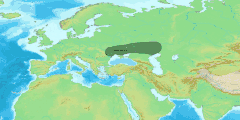Paeonian language
Paeonian[2], sometimes spelled Paionian, is a poorly attested, extinct language spoken by the ancient Paeonians until late antiquity.
| Paeonian | |
|---|---|
| Paionian | |
| Native to | North Macedonia, northern Greece, south-eastern Serbia, south-western Bulgaria |
| Extinct | probably 4th century CE[1] |
Indo-European
| |
| Language codes | |
| ISO 639-3 | None (mis) |
0iz | |
| Glottolog | None |
| Part of a series on |
| Indo-European topics |
|---|
 |
|
|
Philology
|
|
Origins |
|
Archaeology Pontic Steppe
Caucasus East Asia Eastern Europe Northern Europe Pontic Steppe Northern/Eastern Steppe Europe
South Asia Steppe Europe Caucasus India |
|
Peoples and societies Indo-Aryans Iranians
East Asia Europe East Asia Europe
Indo-Aryan Iranian
|
|
Religion and mythology
Indo-Aryan Iranian Others Europe
|
|
Paeonia once stretched north of Macedon, into Dardania, and in earlier times into southwestern Thrace.
Classification
Classical sources usually considered the Paeonians distinct from Thracians or Illyrians, comprising their own ethnicity and language. Athenaeus seems to have connected the Paeonian tongue to the barely-attested Mysian language, possibly a member of the Anatolian family.
On the other hand, the Paeonians were also regarded as being related to Thracians and ancestors of the Phrygians.
Modern linguists are uncertain on the classification of Paeonian, due to the extreme scarcity of surviving materials in the language. Wilhelm Tomaschek and Paul Kretschmer claim it belonged to the Illyrian family, while Dimitar Dechev claims affinities with Thracian. Irwin L. Merker considers Paeonian closely related to Greek, a Hellenic language with "a great deal of Illyrian and Thracian influence as a result of this proximity".[3]
Paeonian vocabulary
Several Paeonian words are known from classical sources:
- monapos, monaipos, the European bison
- tilôn, a species of fish once found in Lake Prasias
- paprax, a species of fish once found in Lake Prasias. Paprakas, masc. acc. pl.
A number of anthroponyms (some known only from Paeonian coinage) are attested: Agis (Άγις), Patraos (Πατράος), Lycpeios (Λύκπειος), Audoleon (Αυδολέων), Eupolemos (Εὐπόλεμος), Ariston (Αρίστων), etc. In addition several toponyms (Bylazora (Βυλαζώρα), Astibos (Άστιβος) and a few theonyms Dryalus (Δρύαλος), Dyalos (Δύαλος), the Paeonian Dionysus, as well as the following:
- Pontos, affluent of the Strumica River, perhaps from *ponktos, "boggy" (cf. German feucht, "wet", Middle Irish éicne "salmon", Sanskrit pánka "mud, mire", pontos "passage", "way" Greek);
- Idomenae (Ιδομένη) (nowadays near Gevgelija), name of a city (cf. Greek Idomeneus, proper name in Homer, "Ida", mountain in Crete);
- Stoboi (nowadays Gradsko), name of a city, from *stob(h) (cf. Old Prussian stabis "rock", Old Church Slavonic stoboru, "pillar", Old English stapol, "post", Ancient Greek stobos, "scolding, bad language");
- Dysoron (Δύσορον) (nowadays Dysoro (Δύσορο)), name of a mountain, from "dys-", "bad" (cf. Greek dyskolos "difficult", and "oros" Greek oros, "mountain");
- Agrianes, name of a tribe, possibly from *agro- "field" (cf. Latin ager, Greek agros with cognates in the Greek tribe of Agraioi who lived on the Acheloos and the name of the month Agrianos or quite possibly from Greek agrios, "unruly", "wild".
The Indo-European voiced aspirates (*bh, *dh, etc.) became plain voiced consonants (/b/, /d/, etc.), just like in Illyrian, Thracian, and Phrygian.
References
- "Paeonia". Encyclopædia Britannica online.
- Harry van der Hulst, Rob Goedemans and Ellen van Zanten as ed., A Survey of Word Accentual Patterns in the Languages of the World, Empirical Approaches to Language Typology, Walter de Gruyter, 2010, ISBN 311019631X, p. 433.
- "The Ancient Kingdom of Paionia,". Balkan Studies 6. 1965.
- Francisco Villar. Gli Indoeuropei e le origini dell'Europa. Il Mulino, 1997. ISBN 88-15-05708-0
- Kevin Hodges (November 2010). "Fluent in 60 Seconds: Learning a new language is a breeze—as long as it's Paionian". Smithsonian magazine.